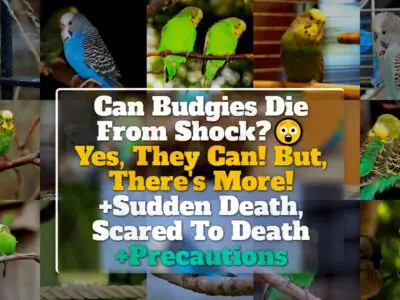Being a former veterinary worker with a decade-long career span and an avid bird lover, I am thrilled to share my knowledge about a rather poignant topic – Do budgies grieve and mourn death?
Indeed, budgies grieve and mourn the death of their companions, demonstrating signs such as excessive head bobbing, behavioral changes, and self-isolation.
These symptoms stem from the intense bond they form with their peers.
Helping a grieving budgie involves providing companionship, distractions, a comforting environment, and proper nutrition.
Why Do Budgies Grieve For The Loss Of A Companion?
In the cozy confines of a budgie cage, we often see budgies forming deep bonds with their feathered companions.
You’ll see them preening each other’s feathers, sharing food, chirping together – signs of a camaraderie that runs deeper than shared cage space.
When one of them departs this world, it creates a void, an absence that the surviving budgie feels intensely.
This loss often triggers a grief response in budgies, akin to how humans mourn the loss of their loved ones.
They comprehend that their companion is not coming back, resulting in noticeable changes in their behavior, indicating grief.
Signs Of Budgie Grief – How To Recognize Grieving Budgie?
The first step towards helping your grieving budgie is recognizing the signs of their grief.
In the following sections, we will highlight common indicators of grief in budgies.
Behavior Changes
As one observes a budgie in the throes of grief, it’s the behavior changes that often strike as most noticeable.
A previously lively and chirpy budgie may take on a more subdued persona, their usual chatter replaced with silence.
They might seem less interested in their favorite toys, barely acknowledging the colorful array that usually enthuses them.
You might notice the budgie retreating to the bottom of the cage more often, a stark change from their normal perching habits.
This shift in behavior is their response to the profound sense of loss, a coping mechanism as they grapple with their grief.
Lack Of Appetite
Just like humans, budgies too may lose their appetite when they’re grieving.
The loss of a companion can trigger such intense emotional stress that it affects their eating habits.
You might notice your budgie ignoring its food or picking at it disinterestedly, its usual gusto for mealtime noticeably missing.
It’s not unusual to find them consuming lesser quantities than usual, or even fasting for short periods.
This lack of appetite can be a tangible manifestation of their grief and a clear sign that your feathery friend is mourning.
Feather Plucking
Feather plucking is another sign of emotional distress in budgies.
When grief-stricken, these colorful creatures may start pulling out their own feathers, resulting in noticeable bald patches.
This behavior can serve as a self-soothing mechanism for the budgie, similar to how humans may wring their hands or pace when anxious or upset.
However, feather plucking can also lead to physical discomfort and even injury, making it a clear indication that your budgie is grappling with the loss and is in need of support.
Absence Of Singing
The strain of grief can silence these normally vocal birds.
The absence of singing, chirping, or a significant reduction in their vocalization, can indicate that a budgie is mourning.
Their once melodious cage might seem eerily quiet, the lively chatter replaced with an unsettling silence.
This stark change is one of the most poignant signs of a grieving budgie.
Self-harming Behaviors
In extreme cases, grieving budgies may even resort to self-harming behaviors, such as biting or scratching themselves.
Excessive Head Bobbing
One of the signs to look out for is excessive head bobbing.
While head bobbing is a normal behavior in budgies, excessive bobbing can indicate stress or anxiety, which could be a manifestation of grief.
Self-isolation
A budgie may withdraw from its usual activities and prefer to stay alone, often in a quiet corner of the cage.
This is another common sign of grief in budgies.
How To Support And Help A Grieving Budgie?
Recognizing that your budgie is grieving is the first step towards helping them.
In the following sections, we will explore ways to help and support a grieving budgie.
Providing Attention And Companionship (Keep The Surviving Budgie Entertained)
Providing your grieving budgie with attention and companionship can play a key role in helping them recover.
Budgies are social creatures, and they thrive on interaction.
Engage with your budgie by talking to them, playing soft music, or simply spending time near their cage.
Offering Distractions And Mental Stimulation
Distractions can be beneficial in helping a grieving budgie recover.
Offering new toys or introducing new activities can keep the budgie mentally stimulated, thus reducing the focus on their loss.
Introducing A New Budgie Companion (If Appropriate)
In some cases, introducing a new budgie companion can be beneficial.
However, this should be done carefully, considering the grieving budgie’s emotional state.
It is essential to monitor their reactions to the new companion and ensure that they are comfortable with the introduction.
Create A Comforting Environment
Creating a comforting and familiar environment can provide a sense of security to a grieving budgie.
This could include maintaining a consistent light-dark cycle, keeping the cage in a quiet place, and ensuring that the budgie feels safe in their environment.
Ensure Proper Nutrition
A balanced diet is crucial for a budgie, especially when they are grieving.
Providing a variety of fresh fruits and vegetables, along with their regular birdseed, can help maintain their physical health, which in turn can support their emotional recovery.
Do Budgeis Mourn The Loss Of Their Babies?
Budgies, much like other animals, exhibit a strong parental instinct towards their offspring.
The loss of a chick can evoke a range of reactions in parent birds, which can be interpreted as mourning.
They may linger around the nest for a while, appearing visibly distressed or calling out in what seems like an attempt to reach out to their lost chick.
This behavior isn’t confined to budgies alone.
Across various bird species, such reactions to the death of a chick are observed, affirming that birds do, in their own way, mourn the loss of their babies.

![Can Budgies Get High? [Signs, Avoiding, Getting Stoned]](https://www.petiska.com/wp-content/uploads/2022/07/can-budgies-get-high-signs-avoiding-getting-stoned-1658920985-400x300.jpg)
